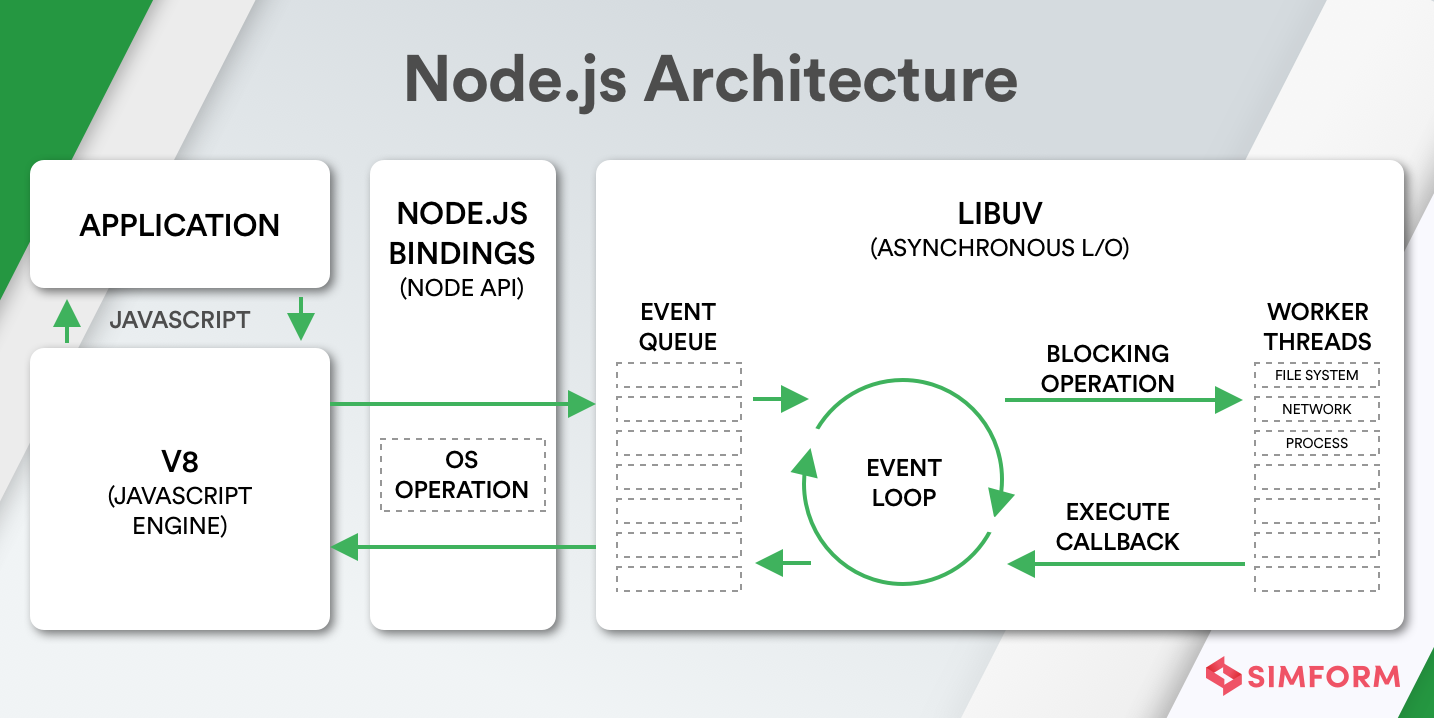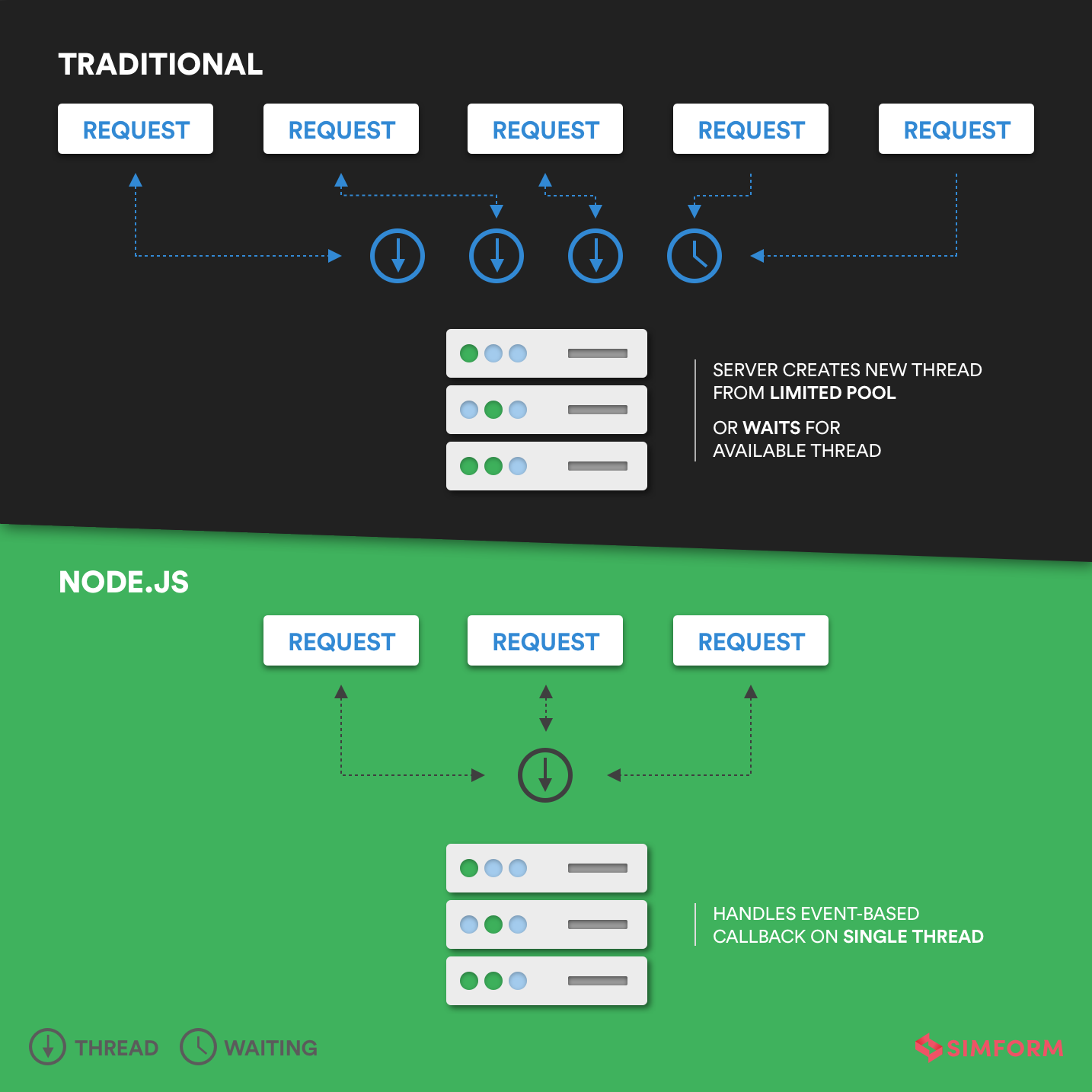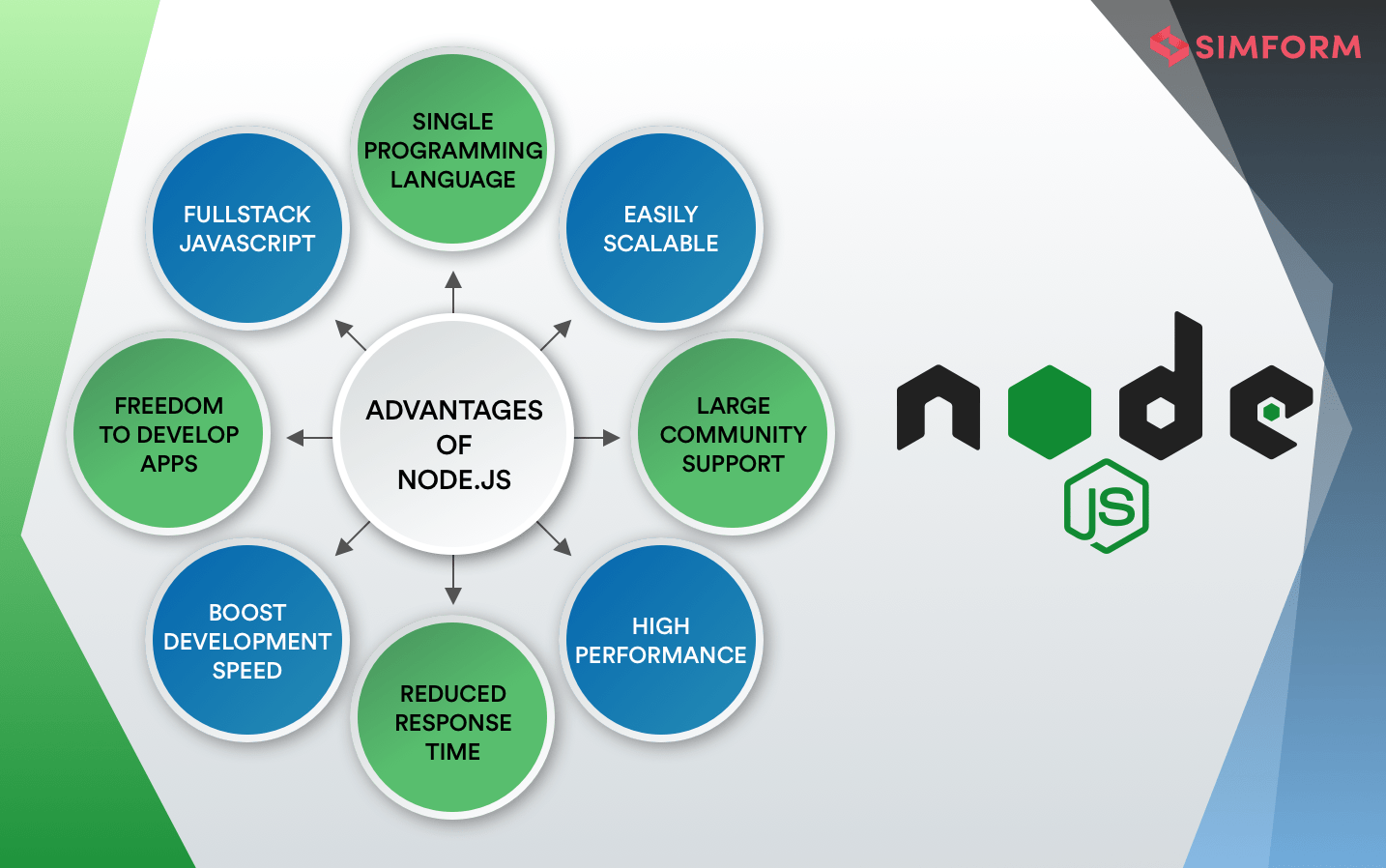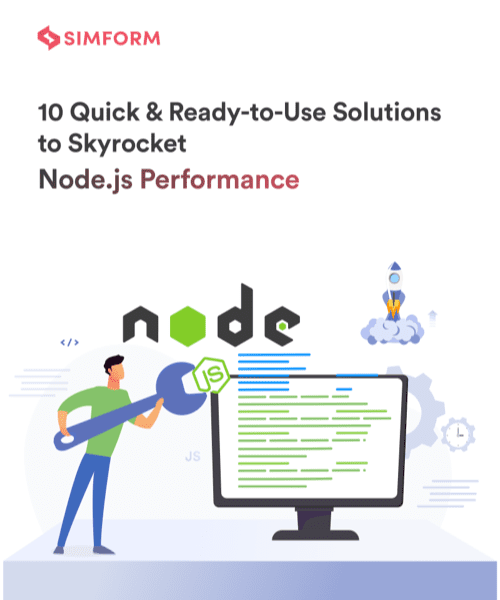Did you know Node.js is the primary JS runtime environment for eBay and AliExpress too? In 2018 there were 23 million developers in the world, and we are still counting. Let’s dive in and understand more about how Node.js is worth your time, resources, and investment in your upcoming project. We have covered a few compelling use cases to explain various applications of Node.js. Make well-informed decisions for a future project.
Gigantic companies are powered by Node.js, and this has invoked trust in upcoming and growing firms to move ahead with Node.js. If you have the same goal and want to install Node.js, be sure to browse through Simform’s web development offerings.
What is Node.js?
Node.js – an open-source Chrome’s Javascript runtime environment – allows you to develop scalable web applications effortlessly. This environment is built on top of Google Chrome’s JavaScript Engine V8. It uses an event-driven, non-blocking I/O model, making it lightweight, more efficient, and perfect for data-intensive real-time applications running across shared devices.
Before proceeding further, here are two facts that you must know.
- Node.js isn’t a programming language or framework; instead, it’s an environment for them.
- Contrary to the popular opinion that Node.js is used for building servers only, the truth is – it can be used on the front and backend both.
Node.js Architecture
Node.js is the epitome of exceptionally customizable and scalable tech. The server engine utilizes an event-based, non-blocking I/O model. This makes the adaptation of Javascript easier to the machine language providing quick execution of the code.
First, let’s understand these terms / the key features that make Node.js popular and understand better how Node.js works.
- Asynchronous/Non-blocking thread execution – Every API of the Node.js library is non-blocking. While waiting for a response for something outside the execution chain, the next tasks in the stack are continuously executed.
- Event-driven – A server built with Node.js uses a notification mechanism called “Events” to receive and track responses of previous API requests. Event Loop allows Node.js to execute all the non-blocking operations.
- Cross-platform compatibility – Node.js is compatible with various platforms like Windows, Linux, Mac OS X, Unix, and mobile platforms.
The Js website states that the language has 1,444,231 libraries and is still counting. The code operates faster in server-to-client direction because of Javascript and Node.js. This improves the performance ability of the web applications to another level. The best part is – web application development in Node.js enables a steady and secure non-blocking I/O model, simplifying the code.

Node.js runs on Google’s V8 Javascript engine, where web applications are event-based in an asynchronous manner. Node.js platform uses a “single-threaded event loop.”
So, how exactly does Node.js handle concurrent requests along with a single-threaded model? Well! “Multi-threaded request-response” architecture is an event loop that is much slower and unable to handle multiple concurrent threads at a time.

The platform does not follow a similar request/response multi-threaded stateless model; instead, it goes by a simplified single-threaded event loop model. As per Node.js developers, a specific library called “Libuv” provides this mechanism known as an event loop. This Node.js processing model is majorly based on Javascript event-based model along with the callback mechanism.
Unlike the traditional web-serving technique, where each request creates a new thread cramping up the system RAM, Node.js operates on a single thread. This enables it to support thousands of concurrent connection handling event loops.
Check out the 12 best Node.js frameworks with their characteristics and popularity to build web apps in 2022.
NPM: Node Package Manager
While we are trying to understand the basics of Node.js, we definitely don’t want to miss out on its built-in support for package management using npm. A popular package library – npm, is the most prized possession of the Node.js community. It contains millions of downloadable libraries according to the specific requirement.
These massive libraries are absolutely free of cost with their registry hosting millions packages of reusable Node.js code. These libraries are getting bigger rapidly with each passing day, making the Node.js community stronger.
NPM is indeed the world’s largest software registry. Yes, that’s right!
Open-source developers from every continent use npm to share or borrow packages, and many enterprises also utilize them for their private developments. Find the entire list of packaged modules on the npm website.
Node.js keeps adding remarkable features with version updates to enhance the performance and improvise the diagnosis.
Top useful npm modules
The minimalist approach inspires some of the most useful npm modules today.
# NPM: Express.js # NPM: Sails.js
# NPM: Meteor.js # NPM: Hapi.js
# NPM: Koa.js # NPM: Total.js
# NPM:Nest.js # NPM: Loopback.js
# NPM:Mongo.js # NPM: socket.js
These useful npm modules help you create a module that allows focusing on many essential elements such as high performance, automating time-consuming tasks, robust routing, and super-high test coverage.
Go through the js tutorial to get started with the basic ‘Hello World” program and learn how to insert JavaScript programs almost anywhere into an HTML document using the <script> tag.
Advantages of Node.js

Scalability:
Node.js applications are easily scalable, vertically and horizontal. While vertical scaling lets you add more resources to the current nodes, horizontal scaling enables you to add new nodes quicker. Furthermore, Node.js applications do not require a large block in the entire development process, for it works along with a set of microservices and modules. It’s as simple, easy, and fits perfectly for startups that are looking to grow.
High performance:
V8 JS engine complies with Javascript code directly into the machine code. This makes it resource-efficient as well as accelerates the framework’s speed. In addition, Google itself invests heavily in its search engine to consistently improve its performance.
Large community support:
Established in 2015, Node.js Foundation is an impressive group of founders from leading enterprises such as IBM, Microsoft, Fidelity, and SAP. An enormous number of software developers and many active Node.js fans are constantly contributing to the ever-evolving and nurturing Node.js community to support the fellow developers. Additionally, Node.js is supported on Github which makes it super easy and fast to develop and support the framework.
Boosts development speed:
Node.js allows you developers to accelerate the web app development process with its lightweight and varied tools. The npm registry offers numerous solutions, modules, and libraries to create web apps by acquiring more value and investing in a lesser effort. Node.js, along with npm libraries, helps you reduce bugs and decrease the size of your web application with its reusable templates. This optimization directly influences the time to market.
Freedom to develop apps:
Developers working with Node.js get the freedom to develop cross-platform apps. With frameworks like Electron and NW.js, you can create cross-platform web apps with Node.js since it’s compatible with desktop, mobile, and web development for Mac, Windows, and Linux. Node.js is now widely the chosen one for IoT solutions as well. So if you are looking to enhance your team’s coding efficiency and performance, Node.js is your best bet.
Single programming language:
Node.js offers a cocktail of similar languages on front-end and back-end Javascript. It is actually more accessible and flexible than it sounds. It makes the entire web app development cycle robust and seamless for developers and enterprises. It saves time, energy, and resources man-hours investment more productive and profitable. Not only does Node.js make web app development convenient, but it also makes it the most preferred tech in the market today.
Contribution to fullstack & MEANstack:
Node.js has proven its potential and is a part of a robust tech stack with Javascript being the undisputed leader amongst leading programming languages. Node.js, as a stand-alone, brings many benefits to the tech stack; for instance, it offers the JSON module library. With more than 368,985,988 downloads i.e an average of 1,010,921 per day, Node.js has become a significant player in many tech ecosystems.
Rich ecosystem:
When it comes to the simplicity and richness of Node.js, npm is the only word that comes to your mind. Did you know? npm has 836,000 libraries, and 10,000 or more are published every week. Yes! over 475,000 packages and registries are available and 11,000 new tools weekly. It is reducing a great deal of time and cost involved in the development and time-to-market.
What is Node.js used for?
Node.js – based business solutions give you an edge over your competitors. Here are the use cases of Node.js:
- Backend for social media networking
- Single-page application
- Chat application
- Data streaming
- IoT application
So let’s just jump into the best use cases used by many industries and get a more reliable idea of Node’s positioning.
Backend for social media networking
Many renowned names such as LinkedIn and Medium are rebuilt on Node.js. An essential combination of nodes is needed to build a backend for a social media networking site. Node.js provides blazing-fast routing with its V8 engine along with secure authentication. Scalability is one of the most significant factors which enriches a social media network.
Single-page application (SPA) development
Like single-page websites, Node.js can build a single-page app, where the look and feel are similar to a desktop application. Due to its versatile options, Node.js is a good fit for building social networking platforms, dynamic websites, and mailing solutions. What’s more, the asynchronous data flow quality on the backend in Node.js makes it the best bet for SPA development.
Chatbots
Node.js offers exclusive advanced functionalities for real-time chatbots and chat applications. The key features such as multi-user applications, intensive data, heavy traffic across all devices are very popular in chatbots. Node.js hits the sweet spot, for it runs across different devices and covers all paradigms in chat and chatbot apps. In addition, Node.js makes it easy to execute push notifications and server-side event loops popular in IMs and real-time apps.
Data streaming
Giants like Netflix welcomed Node.js to serve 190 countries and 100+ million hours of streaming across 120 million users and counting. Node.js has a definite edge on this as the processing files at a super-fast speed and feather-light encodes and uploads. This has been encashed upon by many online fashion e-stores and applications with massive data streaming videos.
IoT application development
IoT has drastically become popular over the recent decade. Since then, Node.js has been one of the most preferred solutions for organizations looking to build public and private IoT solution systems. The very core advantage of Node.js is its brilliant ability to process seamlessly concurrent requests with thousands of events released by billions of devices on its network. Thanks to Node.js event-driven server architecture and asynchronous processing relevant heavy I/O operations on IoT networks. Furthermore, Node.js operates on writable and readable channels and streams, which is why it is the most suitable platform for IoT app development.
Where Node.js shouldn’t be used?
We have looked at many popular Node.js benefits so far, but there are a few cases where we shouldn’t consider it. While analyzing the right technology to get the job done, you might encounter many other tech options. Although every tech has its benefits and pitfalls, the question boils down to only one major factor: if you are building any of the following applications, you may want to reconsider your decision.
Server-side web application with a relational database on backend
With Node.js – express.js, you can also create a vanilla web application on the server-side. In case these web applications have any heavy CPU-intensive computation, it will block Node.js responsiveness. Since the Relational DB tool by Node.js is still underdeveloped, it’ll be wise to pick up other environments to perform relational operations.
Heavy server-side processing
Node.js is probably not the best choice for heavy server-side computation due to its event-driven and non-blocking I/O node models. It blocks incoming requests while those threads are busy working on computing numbers.
CPU intensive computations
The node beauty of the minimalistic approach has reflected quite well and has set several performance records. Since Node.js is single-threaded, chances are it might not work for your web applications. If you have a heavy computation that the server is responsible for processing, it gets blocked invariably.
Imperfection in tools
Node.js has proven to be remarkable in many instances and use cases. Nevertheless, despite having the privilege of a highly talented Node community contributing to npm modules and libraries, many have reported buggy, poor quality with incomplete modules, and lack of documentation. However, if you have expert Node.js developers, you can be sure to pick the right npm modules and libraries for your project.
Check how we extend social media engagement of Red Bull by creating Photobooths using Node.js
Examples of popular companies using Node.js
The one common thing between Netflix, LinkedIn, and Uber is that they all had a robust tech team to make critical and crucial analysis before switching to Node.js. So let’s understand this more closely:
Netflix:
With over 130 million subscribers and one billion hours of weekly data streaming, Netflix was looking for a scalable solution that could enable it to handle multiple requests simultaneously.
Enter Node.js! The team chose the technology so they could use the same language in the backend and frontend. They also built a SPA that significantly decreased its startup time. This resulted in an overall reduction of the startup time– from 40 min to under 60 seconds.
LinkedIn:
Back in 2016, LinkedIn had around 63 million members, out of which 59% interacted with their mobile app. To handle the increase in users, LinkedIn picked Node.js, which enabled it to boost its performance by 20x times in some cases. What’s more, they were able to reduce servers from 30 to 3, lower memory overhead, and draw their focus on application development instead of troubleshooting.
Uber:
Uber is one of those first 3 companies that dived into Node.js in the full production stage. It required a high-speed and scalable application and a cross-platform tech solution to manage a colossal number of requests. In addition, they needed a tech solution that could match multiple riders to their drivers in fractions of seconds.
Conclusion
Did you know that Node.js is used regularly by 98% of Fortune 500 companies? Reasons? Lightweight, fast, and scalable. This JavaScript runtime built on V8 is also efficient in handling multiple requests simultaneously. It’s more time- and cost-efficient than other tech stacks to handle the traffic of your application.
The list can go on and on!
This technology is an effective solution for startups to speed up and simplify development and for leading enterprises to utilize a sophisticated ecosystem.



bathini vinay
great sir it will help us briefly about how to start nodejs